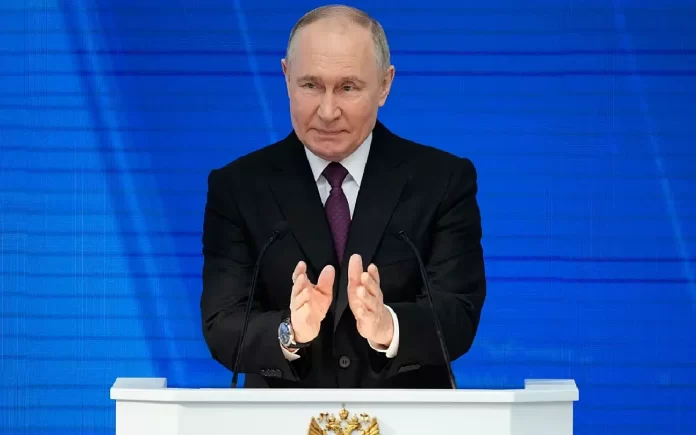Moscow: Vladimir Putin is on the verge of securing another six-year term as the leader of Russia in an election devoid of opposition, scheduled for this weekend. The Kremlin anticipates that the vote will demonstrate overwhelming support for Putin’s actions in Ukraine.
Since the end of 1999, Putin has maintained leadership positions as both president and prime minister, overseeing governance amidst various challenges and viewpoints within Russia.
If successful in the March 15-17 election, Putin will extend his tenure in the Kremlin until at least 2030, surpassing the duration of any Russian leader since Catherine the Great in the eighteenth century.
Read More: Japan Bolsters LNG Supplies, Leans on Allies Australia and US for Long-Term Contracts
The upcoming election occurs at a time when Putin enjoys considerable confidence. Russian troops in Ukraine have made significant advances on the battlefield, while Putin’s most prominent critic, Alexei Navalny, passed away in an Arctic prison colony last month.
Despite facing condemnation from the West, the Kremlin asserts that the election will showcase unwavering domestic support for Putin and his military campaign. Dmitry Peskov, Putin’s spokesman, has stated that there are no viable contenders against Putin and that competition is unrealistic.
While the electoral process carries ceremonial significance, the Kremlin approaches it with utmost seriousness. Extensive resources have been allocated to a campaign aimed at rallying support for Putin. The president has embarked on nationwide tours and has been featured in media, projecting an image of strength and decisiveness.
Read More: ISRO Scientist Advises Against RK Beach for FSB, Recommends Safer Alternatives
Chatham House fellow Nikolai Petrov emphasizes the importance of the elections for the Kremlin, stating that they serve to demonstrate overwhelming public backing for Putin, particularly amid the ongoing military offensive.
The Kremlin’s goal is to secure a higher level of support for Putin compared to his previous election victories. In 2018, Putin officially garnered 77.5 percent of the vote, amidst allegations of electoral malpractice. This year, Putin faces three other contenders, albeit Kremlin-approved candidates intended to maintain the appearance of competition.
The electoral process extends to Ukrainian regions claimed by Moscow in 2022, including the annexed Crimea peninsula. Analysts note that the Kremlin is less concerned about presenting the vote as a legitimate democratic exercise and is primarily focused on reaffirming Putin’s widespread support among political elites.
Despite attempts by the remaining opposition figures to disrupt the election process, the Kremlin remains resolute. Navalny’s widow, Yulia Navalnaya, has called for anti-Putin demonstrations, but the Kremlin appears unfazed, dismissing criticism of the electoral system.
“We will hold the kind of elections that our people need,” Peskov reiterated, emphasizing the Kremlin’s commitment to its version of democracy.



